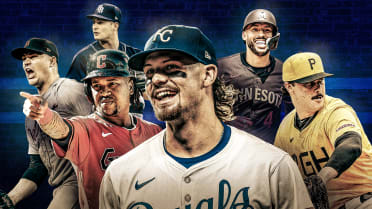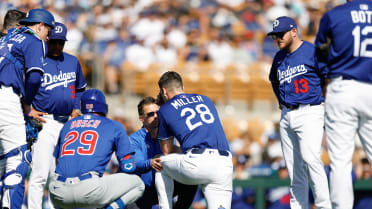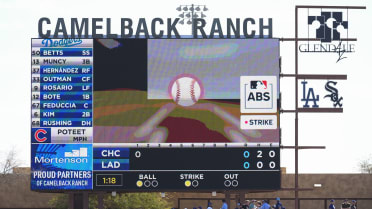10 moments that defined Williams' career
CHICAGO -- Billy Williams' swing was sweet and his production steady. His career was full of achievements and jaw-dropping moments that made him a fan favorite among Cubs fans and a no-doubt inductee for baseball's Hall of Fame.
For the beloved Cubs teams of the 1960s and '70s, Williams was a Rookie of the Year recipient, six-time All-Star, batting champion and twice an MVP runner-up. He ranks in the top five in Cubs history for games, at-bats, hits, homers, doubles, runs, RBIs, walks and more. Only Ernie Banks tallied more extra-base hits and total bases than Williams in the team's long, storied history.
Over the course of 18 seasons in the Majors, Williams hit .290 with 426 homers, 434 doubles, 1,410 runs scored, 1,475 RBIs, 2,711 hits and almost an identical showing for walks (1,045) and strikeouts (1,046).
With all of that in mind, here are 10 moments that helped define Williams' career:
1. Beating Stan's streak
Between games of a doubleheader on June 29, 1969, the Cubs held a ceremony on what was dubbed "Billy Williams Day" at Wrigley Field. In Game 1, Williams tied Stan Musial's National League record for consecutive games played (895). When the Cubs outfielder played the day's second tilt, he established a new mark.
More than 40,000 fans packed into the Friendly Confines for the twin bill to celebrate their "Iron Man" -- a moniker later attached to Cal Ripken when he set the all-time streak record across the 1980s and '90s. According to a Chicago Tribune report from that afternoon, Williams was presented with a long list of gifts, including a new Chrysler, a color television set, a dog, a boat and trailer, a billiard table, a portable typewriter and more.
Williams kept his impressive streak going through Sept. 2, 1970, before asking manager Leo Durocher for a well-deserved day off. In total, Williams played in 1,117 consecutive games, which remains sixth on baseball's all-time list. That streak held as the NL's record until Steve Garvey appeared in 1,207 games from Sept. 3, 1975-July 29, 1983.
"It took a long time to get me out of there," Williams was quoted as saying after the game that ended his streak. "But sometimes a player can get so wrapped up in record streaks it hurts his club."
2. Winning Rookie of the Year
After appearing in 30 games combined in the 1959-60 campaigns, Williams got a regular shot in the Cubs' lineup for the summer of '61. Through his first 60 games, Williams slumped to the tune of a .206/.261/.290 slash line with two homers and 10 RBIs. A 2-for-4 showing in Game No. 61 ignited a spark that carried Williams to the '61 NL Rookie of the Year Award. From that point, Williams hit .296/.357/.533, including a .409 average in June, to finish the year with a .278/.338/.484 slash line. The outfielder ended with 25 homers, 20 doubles, 75 runs scored and 86 RBIs to beat Milwaukee's Joe Torre for the league's top rookie honor.
3. An (almost) MVP-caliber season
In the wake of the Cubs' disappointing collapse from contention in 1969, Williams found another level in the batter's box in '70 for the North Siders. He used that sweet lefty swing to lead the Majors in hits (205) and total bases (373), while also pacing the big leagues in runs scored (137). Williams hit .322/.391/.586 with 42 homers, 34 doubles, 129 RBIs and more walks (72) than strikeouts (65). Alas, it was not enough for an 84-win Cubs team that missed the playoffs, nor was it enough to claim the NL's MVP trophy. That went to catcher Johnny Bench, who garnered 22 of 24 first-place votes. Williams received the other two.
4. Capturing the batting crown
Going into the 1972 campaign, Williams was carrying nearly a .300 career batting average. He had topped .300 in a season four times to that point and had hit at a .306 clip across the '69-71 campaigns. What Williams had not achieved yet was winning a batting title. That changed in '72, when the outfielder's consistency ended with him sporting a .333 average that led not only the NL, but the Majors. A pair of Atlanta hitters, Dusty Baker and Ralph Garr, tried to catch Williams down the stretch. Baker hit .363 in his final 21 games, while Garr batted .381 in his last 18 contests. Baker and Garr ended the year batting .321 and .325, respectively, to fall short of Williams' performance.
5. Going 8-for-8 in one day
Williams' batting crown in 1972 may not have happened without one incredible day in the middle of the summer. On July 11, 1972, the Cubs hosted Houston for a doubleheader at Wrigley Field. In Game 1, Williams went 3-for-3 with a homer, a sacrifice fly and three RBIs. It was a classic Williams display, but the outfielder was only getting started. In Game 2, he ripped off another five hits (including a double and a homer), giving him an 8-for-8 showing in one day of work. Williams entered the twin bill with a .310 average and headed home with a .328 mark on the season. Including that eight-hit day, Williams hit .481 in 20 games to close out a remarkable July.
6. Billy's natural cycle
Williams had 34 games in his career with at least four hits, but one historic showing stood out from the rest. On July 17, 1966, Williams hit for the cycle in the nightcap of a doubleheader against the Cardinals in St. Louis. Not only that, but Williams completed a natural cycle, notching the single (first inning), double (third), triple (fifth) and home run (seventh) in order against Chicago's rivals. At the time, it marked the ninth natural cycle in MLB history. At that point in time, it was also the seventh cycle (of any type) in Cubs annals.
7. An Opening Day walk-off
On April 6, 1971, the marquee matchup of Cardinals ace Bob Gibson and Cubs workhorse Fergie Jenkins lived up to the billing. The ballgame was deadlocked, 1-1, through nine innings with neither pitcher willing to flinch. Jenkins shut St. Louis down in the 10th inning and Gibson retired the first batter he faced in the home half of the frame. That set the stage for Williams, who ended the pitchers' duel by launching a Gibson offering into the right-field bleacher seats for a walk-off blast that sent the Wrigley Field crowd into a frenzy.
8. The '64 All-Star blast
For the 1964 All-Star Game, the NL squad had Williams slotted into the lineup's third spot -- in front of slugger Willie Mays. In the fourth inning, when the American League was clinging to a 1-0 advantage, Williams slugged a John Wyatt pitch out for a game-tying home run. It sparked a two-run inning for the NL, which went on to win, 7-4, with Williams playing all nine innings for the Senior Circuit. In his six career All-Star games, Williams hit .273 (3-for-11) with a .545 slugging percentage.
9. Three shots vs. Mets
Williams enjoyed 32 multihomer games en route to his 426 career blasts, but he only had one three-homer day. In an 8-1 romp over the Mets on Sept. 10, 1968, Williams clubbed a trio of two-run homers to power the Cubs. The first two round-trippers came off Dick Selma. The third shot was part of a back-to-back outburst with Banks against a hard-throwing, 21-year-old, up-and-comer named Nolan Ryan.
10. Billy bests Sandy
Dodgers ace Sandy Koufax was coming off a no-hitter against the Cubs when he arrived to Wrigley Field on Sept. 14, 1965. In the lefty's previous outing on Sept. 9, he piled up 14 strikeouts in his historic performance, including two whiffs by Williams. Koufax began the next outing with five scoreless frames, giving him a 0.28 ERA (one earned run in 32 innings with 35 strikeouts and three walks) to that point on the season against Chicago. Williams snapped the North Siders out of it in the sixth with a two-run homer off Koufax that held up for a 2-1 victory.
Senior Reporter Jordan Bastian covers the Cubs for MLB.com. He previously covered Cleveland from 2011-18 and Toronto from 2005-10. Subscribe to his Cubs Beat newsletter.




